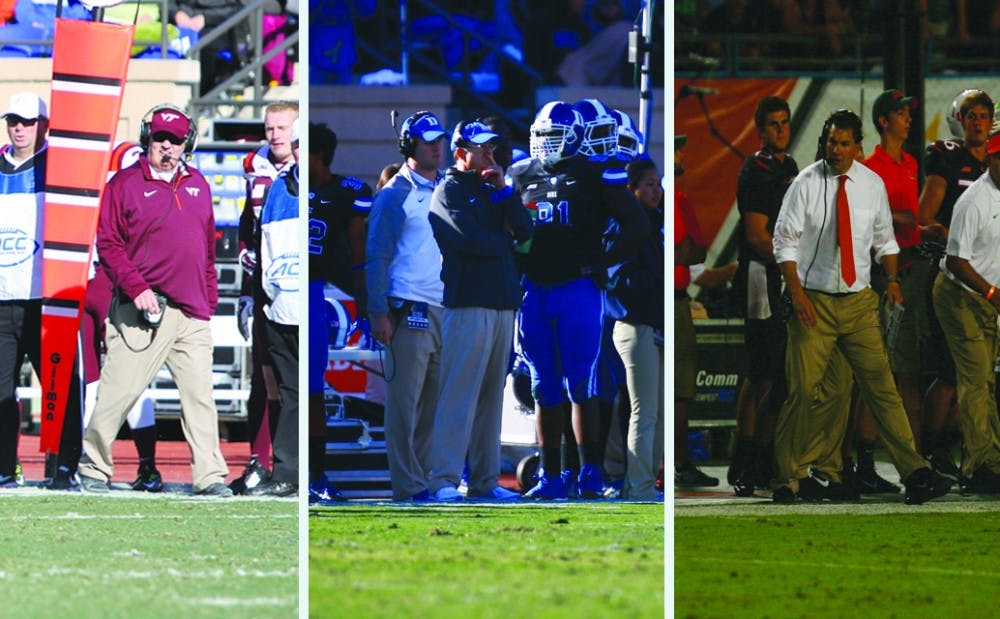In a sport that generates billions of dollars in revenue every year, the greatest indicator of success in college football has proven to be not which program can build the best facilities or attract the most-talented recruits, but which can create a steady coaching situation.
Finding that stable face of the program can be a long, painful search best characterized as an imperfect science.
The college football world was rocked with the resignation of South Carolina head coach Steve Spurrier and the firing of Southern California’s Steve Sarkisian in the past week. Although the programs who go by the name “USC” are now in a state of flux, the changes shed light on one of the most unappreciated aspects of college football—coaching.
The Blue Devils’ next two opponents—Virginia Tech and Miami—present an interesting case of just how unpredictable finding a lead man can be.
During his 28 years in Blacksburg, Frank Beamer has become the staple of Hokie football. Virginia Tech has reached 22 consecutive bowl games and captured the ACC Coastal Division crown six times from 2004-11. Under Beamer, the Hokies have earned a reputation for having a stout defense and timely special teams unit that teamed with a raucous environment at Lane Stadium to make a battle with Virginia Tech a nightmare.
But in the last four years, something has changed. The Hokies have finished 7-6, 8-5 and 7-6 and appear headed for another disappointing finish with their current 3-4 record. Beamer’s success for most of the past three decades has built up plenty of good will with the fans in Blacksburg, but if the Hokies don’t return to their winning ways soon, some of that could dissipate.
Someone who may be close to wearing out his welcome is Miami head coach Al Golden, who has watched “FIRE AL GOLDEN” banners fly over him in Coral Gables. Golden has yet to take his Hurricanes to an ACC Championship game, but has been more scrutinized for his 0-5 record against arch-rival Florida State. Although Miami has averaged the 11th-ranked recruiting class during Golden’s last three seasons, the program has very little to show for it with a 17-17 conference record in the last five years. It’s unlikely that Golden simply forgot how to coach after building Temple into a Mid-American Conference contender before heading to Miami, but at this point anything short of a Coastal title could mean the end of the road.
Pulling the plug on a head coach can throw a program into even more uncertainty and make matters worse before they get better, leaving many athletic directors contemplating when the right time to make a move really is. But is there ever a right time?
A survey of the current landscape gives mixed reviews. First-year head coaches Jim McElwain and Jim Harbaugh have bucked the idea of a transition period and crafted Florida and Michigan into top-15 teams. Granted, both squads were loaded with talent even before their new sheriffs came to town, but the culture changes in Gainesville and Ann Arbor have made fans forget the dark days that preceded. Second-year Texas head coach Charlie Strong needed just one victory—a Red River Rivalry win against Oklahoma—to change the tune in Austin.
And then there are the more gradual transformations that have occurred in Waco, Texas, and East Lansing, Mich., where Art Briles and Mark Dantonio have turned Baylor and Michigan State into two of the top programs in the country. We don’t hear much about Briles’ 15-22 record in his first three seasons as his team gets ready to drop 70 points on another Big 12 opponent. Nor do we hear about Dantonio’s 7-6 and 6-7 records in 2007 and 2009 as his team appears headed for a third consecutive major bowl game—thanks in part to a special teams gaffe by Harbaugh’s Wolverines.
Duke presents evidence for those in favor of a more patient, wait-and-see approach. Head coach David Cutcliffe’s 15-33 record in his first four campaigns in Durham would almost certainly have gotten him the axe at other college football programs and boy, are the Blue Devils glad they stuck with him. Coming off three consecutive bowl appearances, Duke now sits at No. 23 in the AP Poll with its 5-1 record despite ushering in a new quarterback and losing one of the program’s best wide receivers to graduation in the offseason.
If there’s one thing the coaching carousel has taught us, it’s that you simply never know when the time is right.

